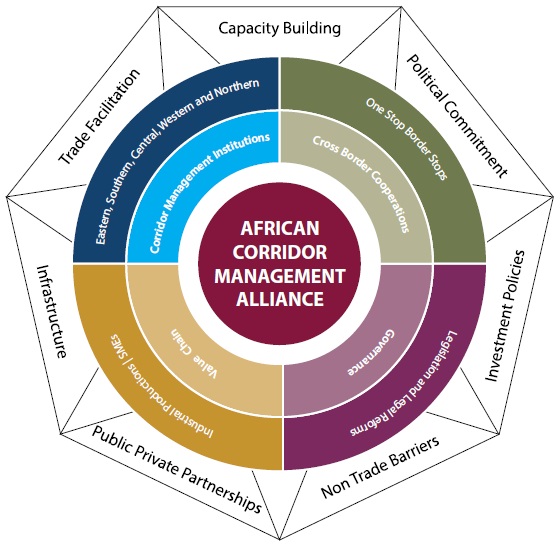News
African Corridor Management Alliance: Strategy document

The African Corridor Management Alliance (ACMA) has been established to provide support in boosting intra-Africa trade, transformation and accelerated integration for sustainable development in the Corridor States. This is to be done within the broader framework of the African Union (AU) Agenda 2063 that emphasizes the promotion of unity, solidarity, cohesion and cooperation amongst the Member States.
ACMA aims to support effective and efficient management and coordination of the work of Corridor Management Institutions (MCIs) and their partners to maximize the benefits and added values towards the continent’s development by harnessing its natural resources. To this end, the ACMA has developed a Strategy Document, with the technical and financial assistance from UNECA, to strengthen the operational capacity of the Alliance.
Preface
The discussion on the role of economic corridors has intensified over the years. A number of studies and stakeholder sessions have highlighted the opportunities and challenges that must be appreciated in exploring the corridor-based development approach. The challenges include, but not limited to border transit time, infrastructure development, logistics capacity and transaction costs. Based on lessons from on-going economic corridors such as Maputo Development Corridor, Walvis Bay Corridor and ALCO, this approach has gained traction as an instrument to promote development that is rooted in the reliable and efficient creation of production capacity to utilize the natural resource endowment for economic transformation. This is to build on linkages for enhanced value chain to harness competitive and comparative advantages in the continent.
Despite being a major source of the world’s natural resource commodities such as minerals and agriculture, Africa lacks a systematic management approach to harness this potential for its own benefit. Most of the resources such as ores, concentrates, metals, and agri-products are exported unprocessed. The inputs for primary production are imported. This provides a case to advocate for an alliance among the African States to energize more up and downstream beneficiation. This strategy document contributes to addressing the best approach for the architect of an African Corridor Management Alliance by providing the Corridor States with lessons, practical tools for the design, capacity development and successful implementation mechanisms for economic corridors.
In this strategy document, an economic corridor is understood to be a collection of routes linking several economic centers, countries, and ports. While some are only road transport corridors, most of them include more than one mode of transport. Some corridors place emphasis on the facilitation of cross-border trade along corridors. The strategy document emphasizes that the defining feature of economic corridors is that they integrate investments in infrastructure, policy and regulatory frameworks, industrialization and value chain, institutional strengthening and capacity building. Through creating a dynamic business environment along the corridors for value addition, harnessing sector linkages, and cross-border trade, the Corridor States will maximize economic growth.
The strategy document includes discussions on objectives and tactical interventions required to realize the outcomes. It also highlights issues on beneficiaries, partnership, and concerns on sustainability. Relating to the outcomes, the possible activities are identified to ensure the realization of the expected output targets. The costing and budget levels needed to implement the planned activities are discussed as part of the enabling institutional arrangements, including the funding mechanisms.
The strategy document emphasizes that with effective management, economic corridors will improve physical connectivity between the Corridor States, thereby enhancing access to markets, while expanding economies of scale for value chain. Within the framework of the Alliance, economic corridors will enhance the productivity and value addition to the endowed natural resources. The ultimate objective is to enable the expansion of space for production into various sectors of the economies, leading to increased use of local raw materials and opening up access to new investment opportunities. The strategy document argues that the realization of economic development through the corridor management presupposes that there is a provision of energy, transportation and effective information exchange to drive the economic transformation process. In addition, development of corridor initiatives will require technical, managerial and financial resources for adding value to the raw materials and natural resources.
Central role of ACMA





